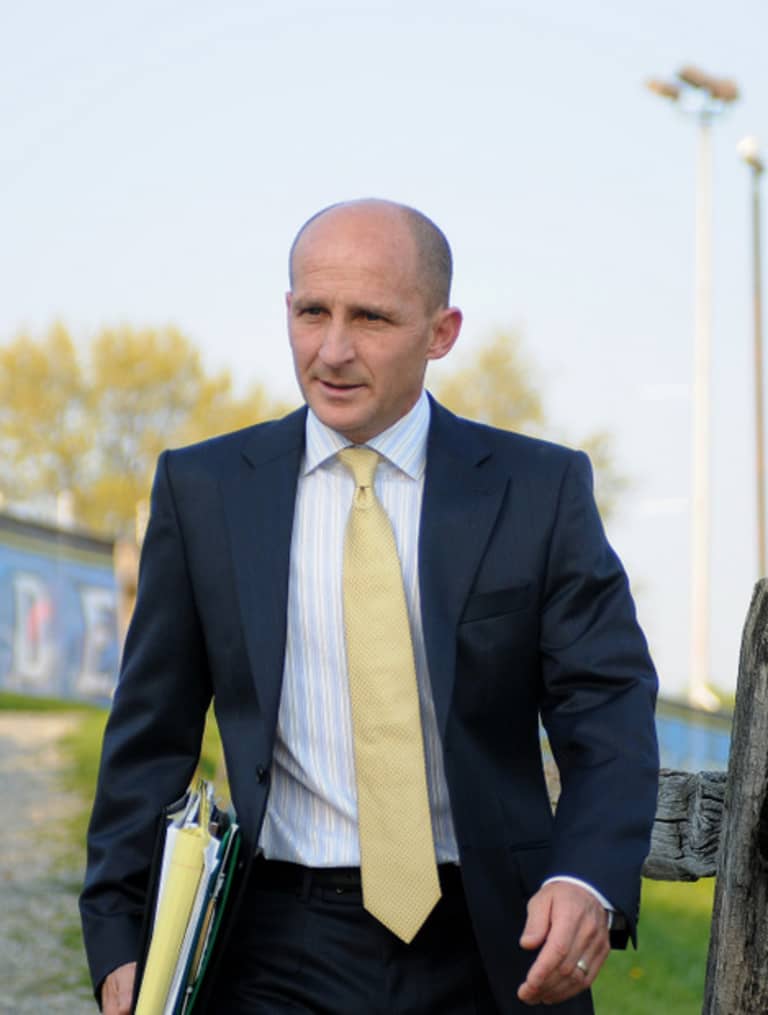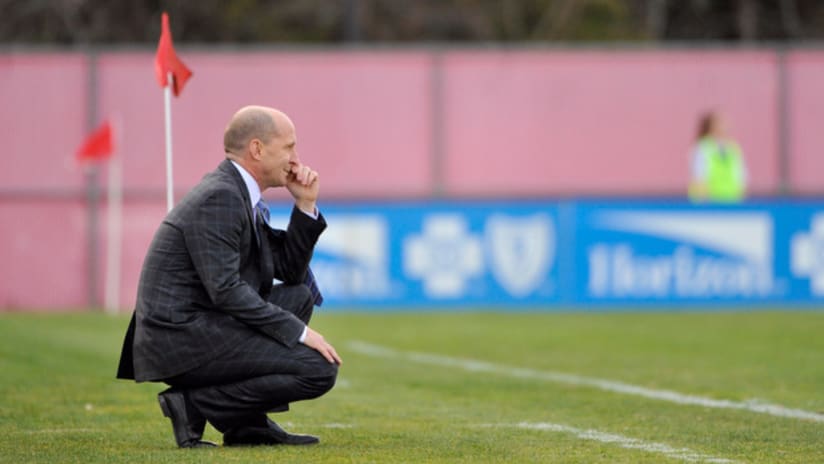After hearing about new Thorns FC head coach Paul Riley’s English roots and experience across American soccer in Part 1 of an exclusive Q&A interview, Part 2 dives into more detail about how Riley is preparing for the upcoming NWSL season, the challenge of taking over a defending championship club, his tactical philosophies for the team and how he likes to keep the opposition guessing.
Coming into a team that won the NWSL Championship, what do you see as the biggest challenges for 2014?
Paul Riley: It’s obviously a tough act to follow the previous head coach in Cindy Parlow Cone because she did win it and you have to give her a lot of credit for winning it. When you win it and you leave, it’s a pretty good deal. It’s not easy for the next person to come in. I’m not sure many people would have wanted the job because it’s not an easy thing to do to come into a team that’s won.
Since we got it, we’ve tweaked some areas on the field where we felt we needed to improve. I think the biggest thing is to improve the home record, get into the playoffs, and get the playoffs at home to host the semifinal and final—that’s what our goal is on the way to winning the championship. The record was 11-6-5 last year, I want to improve the record, the home record was 5-4-2 and I think we need to improve the home record. We need to make it a fortress where nobody wants to come and having the fans’ backing will be critical for us. I think we need to do better at home, be more entertaining at home, be more attacking-based and I’m hoping that more fans will come and watch the games.
If we win all our games at home, it makes going on the road a lot easier. Last year, we had a good record on the road and not so good at home, so hopefully we can improve that. The regular season is important, we want to win the regular season; it’s certainly a goal of ours to win the regular season because we want to host the postseason. It’s not going to be easy. Seattle is a lot better. Houston have had an expansion draft, they’ve got some good players there. Kansas City is strong. Chicago has improved dramatically. Western New York is always going to be Western New York; they’re always in the hunt. There are a lot of teams in the hunt this year. It’s not going to be easy for sure.
- READ: Paul Riley Q&A, Part 1
In light of the Expansion Draft, College Draft, and the recent signings/trades, what’s your feeling with the club’s overall depth?
PR: I think we’ll have a lot more depth than we had last year and the squad will be deeper and stronger; more competitive at practice. That environment will be crucial for us to be more competitive on game day and a little bit more ruthless, which I think we need to be. That comes from practice and having a training regime where they’re competitive and every single practice is important and it’s fun, it’s entertaining and they want to get there and can’t wait to practice. No matter what the temperature is at, they want to be there. I think that’s really the critical piece of the jigsaw puzzle. They’ll be better, fitter, stronger, and hungrier.
It’s easy to say that we have the best team on paper, but we’re going to work much harder on the turf to make sure that we don’t take anything for granted and that every single player on the team is a better player by the time we finish. In WPS, all eight teams were almost identical and every game was tough game. I think this league this year will be like WPS and the teams will be a little bit closer matched and every game will be a fight. That will be better for the national team players, the internationals, and every player that’s in our lineup because that’s the only way you get better—by playing tough games week in and week out.

(ISIPhotos)
You mentioned a little about your training philosophy, is that something you’ve carried with you throughout your coaching career?
PR: I think the energy level at practice is a critical piece. When you’re speaking to players, the reason they want to come to Portland or wherever it might be, is that they want better training. They want to get better. They don’t feel at 24, 25-years old that they’ve come as far as they can and they want to continue to develop. Many of them want to make the national team and those on the national team want to be the best player, the best forward in the world, or whatever it may be. I think dangling that carrot is crucial for these players. They seem really excited about the fact that they’re going to be training and the training is not going to be easy. The first thing I said when I was in Philadelphia was, “This is going to be a job. This is going to be difficult, but it is going to be fun and when you finish you’re going to look back and say “Wow, that was unbelievable.”
We’re going to really push them in training. We’ll do two-a-days a lot, obviously not when the season starts, but that extra training, that extra togetherness, that extra bond around the locker room will give us a recall button and a place where we can go when the going gets tough—and the going always gets tough at some point in the season. I’m hoping we’ll be a good, close-knit team and I want a passionate team. I don’t care if it’s a 2-v-2 or a 3-v-3 in practice, I want everybody to want to win everything and that competitiveness will keep us in good stead to get some big results.
You’ve previously mentioned wanting to have the team play a more attacking and entertaining brand of soccer. What can you tell us about your tactical philosophy?
PR: We’ll be able to play two or three formations. We won’t have one formation. We’ll adapt it. I don’t like to be predictable. We have a lot of weapons and one thing is absolutely assured, we will attack every team and we will go at teams and we will be entertaining to watch.
I’m quite content to win 6-5 than 1-nil. I don’t think you’ll see many nil-nils or 1-nils with us; we’re going to go after teams. We’re going to have a high-tempo team. I want us to play with high energy. We won’t defend with many numbers, but we’re going to attack with a lot of numbers. I’ve played with a diamond in a 4-4-2, a 4-3-3, we could play a 4-2-3-1, but it depends on who is available. You’ll have to be adaptable and we will definitely be adaptable. Most of my youth teams, boys and girls, play a 4-3-3, so I’m pretty flexible with the formation. We’ll have a look at the opposition and I think a lot of them like the 4-2-3-1 system, but we’re going to mix and match it a little bit depending on who we’re playing and if it’s away or at home. I think that unpredictability will make it difficult for our opponents to play against us.












